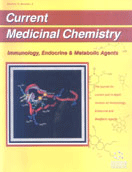Abstract
Breast cancer is often an estrogen dependent disease and several endocrine treatment options are well established in clinical practice. Although ovarian estrogen synthesis ceases at menopause, estrogens may still be produced by the aromatization of androgens. The “aromatase-pathway” is the major (and probably only) source of estrogens in postmenopausal women. While the antiestrogen tamoxifen has dominated the field of endocrine treatment of breast cancer for decades, novel aromatase inhibitors and inactivators have recently challenged the position of tamoxifen. Non-steroidal aromatase inhibitors like anastrozole and letrozole as well as the aromatase inactivator exemestane have shown to have advantages compared to the traditional drugs like tamoxifen and megestrol acetate. Currently, the aromatase inhibitors and inactivators mentioned above are going to be established as first-line treatment in postmenopausal women with hormonesensitive, metastatic breast cancer. In addition, aromatase inhibitors and inactivators have the potential to be used in the adjuvant setting as well as in breast cancer prevention. This publication gives an overview about the experience made with the most important aromatase inhibitors and inactivators in all stages of hormone-dependent breast cancer focusing on the compounds belonging to the so-called “third generation”: anastrozole, letrozole and exemestane.
Keywords: breast cancer, estrogens, aromatase inhibitor, aromatase inactivator, endocrine therapy, anastrozole, letrozole, exemestane
 1
1








